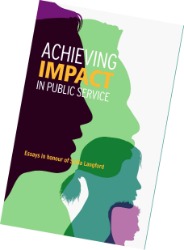 Achieving Impact in Public Service: Essays in honour of Sylda Langford
Achieving Impact in Public Service: Essays in honour of Sylda Langford
This volume is published as a tribute to the remarkable public service career of Sylda Langford which culminated in her appointment as the first Director General of the Office for Children and Youth Affairs. Sylda’s working life was devoted to developing evidence-based policies and services to improve the lives of children and to address social exclusion. She pioneered the structures and systems underpinning childcare policy, juvenile justice, adoption, child protection and equal status that exist today. Her ground-breaking work has had a major impact on the welfare of children and young people in Ireland.
Following an Introduction, the book is set out in three parts with nine chapters by authors who are experienced and expert in areas which reflect the key themes of Sylda’s working life. Each was asked to engage with the topics in a way that would contribute to contemporary discourse and throw light on the challenges involved in making and shaping public policy.
The focus in Part One is on understanding children’s needs – putting practice into policy. Delma Byrne reviews recent trends in the prevalence of child poverty in Irish society, pointing out how income inequality shapes the lives of children. Sinead Hanafin provides an account of the process of building an evidence base for policy and the significant challenges and facilitating factors, notably the impact of high-level leadership. Nóirín Hayes examines the evolution of childcare policy and services in Ireland, describing the period 2000–2005 as the ‘golden age’ of the childcare system, where there was extensive policy development, substantial funding and a sense of a clear path toward a sustainable childcare system.
Part Two concerns the challenges of putting policy into practice and of reaching the most vulnerable. Cormac Quinlan’s chapter on child protection examines the tension between the social worker on the ground seeking to ‘do the right thing’ for children and families, and the need to ‘do things right’ and avoid criticism or failure, by following defined regulated procedures and processes by which performance is measured. Ursula Kilkelly reviews public policy in the reform of youth detention in Ireland in the last two decades, including reorganisation of youth justice structures and the establishment of an Irish Youth Justice Service. She concludes that with protection for children’s rights enshrined in the Constitution, a Minister for Children, a national children’s policy framework, and an Ombudsman for Children, Ireland is now a leading country in the field of children’s rights.
Part Three addresses the wider issues of policy delivery and engagement between state and citizen. Dermot McCarthy considers the procedures and institutional arrangements within the public policy system to promote coherence and consistency in policy formulation and implementation. He concludes that while tensions between policy goals and different organisational requirements will continue, progress can be made if there is an abiding focus on coherence, and that the personal commitment of those in key positions does make a difference. Mary Murphy analyses the changing policy role of the Community and Voluntary sector over recent decades, reflecting particularly on the power dynamics both between the state and the sector, and within the sector itself, drawing particular attention to its gendered nature. Eddie Molloy focuses on the need to reform the culture of the civil service, arguing that attempts at structural change are often compromised because of the existing culture, and advocates that the interrogation and clarification of core values is essential to civil service reform.
In the final chapter Emily O’Reilly discusses the role of the Ombudsman in ensuring citizens’ rights, arguing that the work of the Office has led to a transformation in the culture of the public service, from the inward gaze and protection of self, to looking towards the public and their needs. There follows an Epilogue by Josephine Feehily in which she reflects on the question of whether being a publican’s daughter is a good preparation for a career in the higher ranks of the civil service.